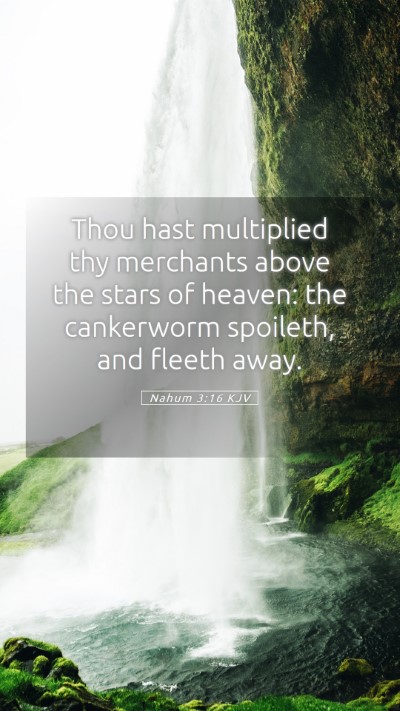Old Testament
Genesis Exodus Leviticus Numbers Deuteronomy Joshua Judges Ruth 1 Samuel 2 Samuel 1 Kings 2 Kings 1 Chronicles 2 Chronicles Ezra Nehemiah Esther Job Psalms Proverbs Ecclesiastes Song of Solomon Isaiah Jeremiah Lamentations Ezekiel Daniel Hosea Joel Amos Obadiah Jonah Micah Nahum Habakkuk Zephaniah Haggai Zechariah MalachiNahum 3:16 Meaning
What is the meaning of Nahum 3:16?
Thou hast multiplied thy merchants above the stars of heaven: the cankerworm spoileth, and fleeth away.
Nahum 3:16 Bible Verse Meaning
Bible Verse Meaning and Commentary: Nahum 3:16
Verse: "Thou hast increased thy merchants above the stars of heaven: the moth is risen up, and hath spread its wings." (Nahum 3:16 KJV)
Understanding Scripture: Nahum 3:16 is a powerful verse that speaks about the economic corruption and excess of Nineveh, the capital of the Assyrian Empire. This verse highlights the great number of merchants in Nineveh, indicating its prosperity but also serving as a condemnation of the greed and moral decay that come with such wealth.
- Merchant of Excess: The term "merchants" symbolizes more than just traders; it represents the thriving, and often corrupt, economy of Nineveh. Matthew Henry notes that their trade was excessive, which reflects the populace's immoral pursuits.
- Stars of Heaven: The mention of "stars of heaven" in this context suggests a level of prosperity that is unattainable and excessive. Adam Clarke indicates that such a reference places Nineveh in a position of arrogance, drawing a parallel to their perceived importance.
- The Moth: The "moth" rising has deep symbolic significance. It serves as a metaphor for decay and destruction that would soon come upon them. As per Albert Barnes, it indicates that though their wealth seemed extensive, it would inevitably be consumed and rendered worthless, just as fabric is eaten away by moths.
Bible Verse Interpretations
Nahum’s prophetic warning encapsulated in this verse is representative of the larger theme found in the book: the absolute downfall of a once-great city due to its wickedness and the consequences of its unchecked consumerism.
- Wealth as a Sign of Corruption: The verse exposes how the abundance of wealth can often lead to greater sinfulness and moral corruption.
- Prophetic Judgment: The verse foreshadows the coming divine judgment upon Nineveh. The detailed description illustrates God’s displeasure with their actions, as per the commentary by Adam Clarke.
- Temporal Prosperity vs. Eternal Truth: While Nineveh appeared to thrive, the ultimate decay foreshadowed by the moth serves as a reminder that material success is fleeting.
Scripture Analysis
Nahum engages with the sin of pride and arrogance, demonstrating how such qualities pervaded Nineveh's culture. This aligns closely with the ideas found throughout Scripture concerning the prosperity of the wicked leading to their ultimate downfall.
Biblical Exegesis of Nahum 3:16
The exegesis of this verse reveals layers of meaning, including a critique of hierarchical economic systems that place importance on wealth and status. It also reflects God's justice against the backdrop of social injustice. The figurative language serves to educate believers about the transient nature of earthly riches.
- Divine Retribution: The moth symbolizes divine retribution. This imagery warns of the fragility of human constructs and systems in contrast to God's everlasting truth.
- Materialism's Downfall: The consequences of materialism emerge as a theme. While wealth may seem enticing, it leads to moral degradation, a point supported by various public domain commentaries.
Meaning of Bible Verses
This verse serves as a profound lesson in humility, warning against the lust for wealth and the error of equating prosperity with divine favor. It presents a clear contrast between human plans and God’s ultimate power to intervene.
Application to Daily Life
Contemplating the implications of Nahum 3:16 encourages believers to engage in self-examination, prioritizing spiritual wealth over material gain. It serves as a cautionary tale about the pursuit of riches at the expense of moral integrity.
Additional Bible Cross References
- Isaiah 47:15: "Thus shall they be unto thee." A parallel to the judgment against Babylon.
- James 5:1-3: A warning to the rich about the rot of their riches.
- Ecclesiastes 5:10: "He that loveth silver shall not be satisfied with silver." The emptiness of material pursuits.


